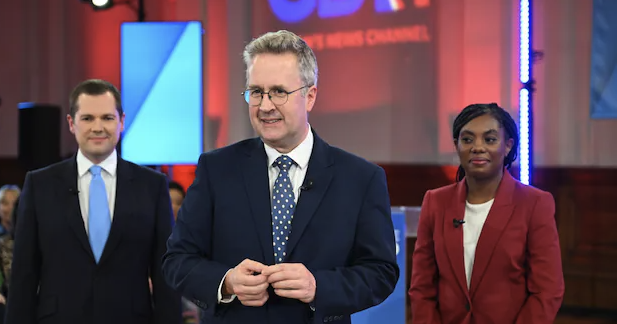The Conservative leadership election started on 24 July. That means we’ve had to wait 86 days for the first public debate between the contenders, which eventually came last night on GB News.
Of course, we only got to see the final two candidates: Kemi Badenoch and Robert Jenrick. A podium debate earlier in the race could have given James Cleverly and Tom Tugendhat their chance to shine, but it never came.
Yes, there were the candidates’ speeches at the Conservative Party annual conference, but a compare-and-contrast would have required anyone who wasn’t there to find the footage online and then watch four separate 20-minute monologues back-to-back. Who is going to do that?
That’s why a podium debate is such a user-friendly format — you see the candidates in parallel. Unfortunately, the format for last night’s debate was serial: an hour of Jenrick followed by an hour of Badenoch (including questions).
Nevertheless, a number of differences between the two hopefuls did stand out. In terms of delivery, Jenrick was calm and fluent, for which he was periodically rewarded with polite applause. Badenoch, by contrast, was animated and insistent, hitting clap-line after clap-line. If the GB News audience is representative of the Conservative Party membership at large, she’ll win easily.
Other than style, the key difference was over policy. For Jenrick, the key to everything is regaining trust over immigration, which in turn means leaving the European Convention on Human Rights. Badenoch, however, is all about principles before policy. “I’m not here to impose what’s in my head on the party,” she said. And as for the ECHR, she’s not sure anyway. A podium debate would have allowed the candidates to challenge one another on this point of tension.
There were other times when they should have been called out. Jenrick was forever promising to “end the drama” — as if that was a barrier to getting things done in government. I don’t ever recall Margaret Thatcher ending the drama.
As for Badenoch, she should have been challenged when she said we should bury electricity cables instead of using pylons. Just a moment earlier, she’d been decrying the cost of energy. For someone who makes great play of being an engineer, she ought to know more about the relative expense of different types of infrastructure.
On the whole, both candidates are accomplished performers, which is precisely why they need to face tougher tests before party members cast their votes. It is therefore ludicrous that voting had started before last night’s debate. Even worse, two other proposed debates — one to be hosted by The Sun and the other by the BBC — have fallen through.
Another format that might have worked is the hard-hitting long interview. During the 2022 leadership campaign, Rishi Sunak submitted to a grilling by Andrew Neil. Liz Truss, however, did not. It might have saved a lot of trouble if she’d wilted under Neil’s fire — and not during her brief but eventful time in Downing Street.
This time round, there’s been no such ordeal for any candidate. Throughout the leadership race, the individual campaigns and Tory HQ have consistently gone for the soft option. Both Badenoch and Jenrick would have us believe they’re made of tough stuff. But thanks to this misconceived leadership contest, we’ll have to take that on trust.











Join the discussion
Join like minded readers that support our journalism by becoming a paid subscriber
To join the discussion in the comments, become a paid subscriber.
Join like minded readers that support our journalism, read unlimited articles and enjoy other subscriber-only benefits.
Subscribe